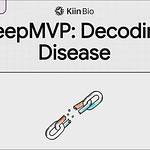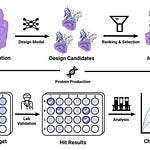Before we start … we are hiring for a few positions (bioinformatician, cheminformaticia, software engineer)! Come and apply!FutureHouse has unveiled Robin, a multi-agent AI system designed to automate the end-to-end scientific discovery process, from hypothesis generation to experimental validation. By integrating literature synthesis, data analysis, and iterative hypothesis refinement, Robin accelerates therapeutic development while uncovering novel mechanistic insights.
Key features of Robin:
Automated scientific workflow:
Combines literature search agents (Crow and Falcon) with data analysis agents (Finch) to autonomously generate hypotheses, design experiments, analyze results, and refine strategies.Crow performs rapid literature reviews; Falcon conducts deep analyses; Finch processes experimental data (e.g., RNA-seq, flow cytometry).
Validated in a lab-in-the-loop framework, with human researchers executing experiments proposed by Robin.
Therapeutic discovery capabilities:
Identified ripasudil, a Rho kinase (ROCK) inhibitor approved for glaucoma, as a novel candidate for dry age-related macular degeneration (dAMD).Proposed enhancing retinal pigment epithelium (RPE) phagocytosis as a therapeutic strategy.
Validated via in vitro assays and RNA-seq analysis, revealing upregulation of ABCA1—a lipid efflux pump linked to dAMD pathology.
Cross-disease scalability:
Demonstrated applicability across 10+ diseases, including idiopathic pulmonary fibrosis, sarcopenia, and Charcot-Marie-Tooth disease, generating ranked therapeutic candidates for each (see Supplementary Figures).Robust validation:
Achieved high concordance with human experimental analysis (e.g., flow cytometry gating, RNA-seq differential expression).
Technical implementation:
Utilizes LLM judges (e.g., Claude 3.7 Sonnet) to rank hypotheses via pairwise comparisons.
Employs reinforcement learning and consensus-driven analysis to ensure reproducibility.
Availability:
Code and sample trajectories are accessible at github.com/Future-House/robin. The code will be released May 27th!
Limitations and future work:
Requires human translation for lab protocols.
Plans to reduce reliance on prompt engineering and incorporate 3D structural data.
Impact:
Robin establishes a new paradigm for AI-driven discovery, bridging literature insights with experimental validation to accelerate drug repurposing and target identification. By automating critical intellectual steps, it promises to scale therapeutic development across complex diseases.
For details, see the full preprint: Robin: A multi-agent system for automating scientific discovery.









